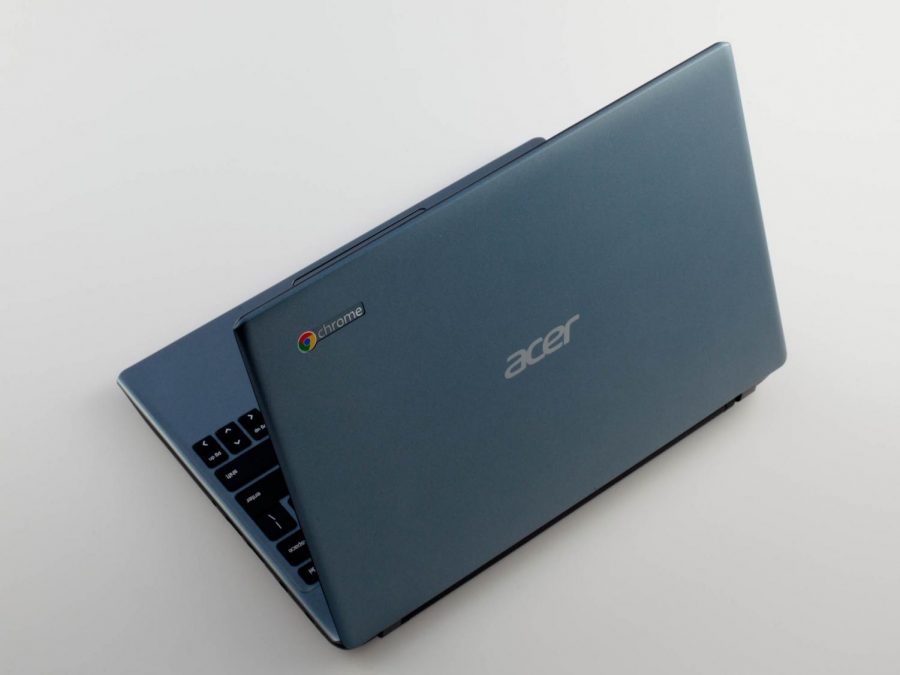EVERYONE:1 has an opinion on the Chromebook rollout
May 29, 2018
On Feb. 13, LASA administrators distributed Chromebooks to students as part of the “EVERYONE:1” initiative, a program aimed to provide students with new technological resources. Every LASA student is eligible to receive a Chromebook from the district as part of the rollout. Though LASA was one of the last high schools in Austin to receive the laptops, the excitement of students and staff was palpable. The students didn’t have to pay for the laptops, but they did come with a different kind of price: responsibility.
The “EVERYONE:1” initiative was put in place to give every student the opportunities that personal computers offer. However, not all students opted to receive Chromebooks. If a student has a personal laptop, parents of the student could sign a form ensuring their child would bring their own computer to and from school everyday. Students were also given the option to leave their Chromebooks at school, instead of taking them home, and to sign them in before and after school.
AISD required all high schools to distribute the laptops, which were district-issued. However due partially to students opting out of Chromebook use, academy director Andy Paulson said that LASA was left with hundreds of other Chromebooks that they had to get rid of. In addition, the touchscreen, internet-only laptops have limitations. They cannot run some programs needed for classes, and run others very slowly, according to teacher Vanessa Mokry, who runs LASA’s audio video production classes.
“I honestly think it’s disappointing that AISD picked [Chromebooks],” Mokry said. “I would like it if you could actually load the Adobe Creative Suite on them, they could run, and be worth anything for this class, but that’s not the case…I just think AISD [is] making a decision that’s not as great as it could be.”
Though Mokry said her class won’t find much use out of the Chromebooks, she said they’ll provide a more general use.
“I have not spent a lot of time investigating, but my initial reactions and initial assessments from just hearing other students is that they cannot do what we really need to do,” Mokry said. “But I do think there are a number of people who are going to get use out of them because the COWS were not reliable. They were a pain, and [the Chromebooks] are better than nothing.”
Unlike Mokry, whose class requires professional-level video editing software, math teacher Charles Barnes says the easier access to technology will benefit his classes, since more of his students will be able to explore concepts using online tools such as GeoGebra and Desmos.
“It’s easy to tell students to put their laptops away,” Barnes said. “It’s not so easy to tell them to conjure up a laptop they don’t have.”
Though Barnes believes having laptops will benefit students in school, he also believes unplugging is important.
“Academically, I think it’s better that kids have Chromebooks; socially, I think it’s worse,” Barnes said. “Maybe I’m just glorifying my experience, but I’m glad I didn’t have a laptop in high school. I would have spent too much time staring at it.”
Paulson shared the nostalgic sentiments, adding how the Chromebook rollout may even affect the library. Instead of using the library PCs, students can now use their own, more portable and faster Chromebooks which will create distance toward the original use of a library.
“You could ask what the purpose of a library is anymore,” Paulson said. “Our library here is what it was like in my day, but I think the library of the future, which hopefully still has books, [will be] mostly a hang out place. A place for kids to have access to charge devices, different things, work with groups in technology and focus.”
Though Paulson at first held reservations with the Chromebook rollout and is still uncertain about how they will affect the campus, he believes they are necessary to LASA.
“Originally I would have said no, but I’m glad we did it now because it’s something that should have been done,” Paulson said. “I’m not sure the Chromebooks will advance the use of technology, but I think it’s what we should have been doing all along, [and] I think it’s nice that we’re now finally on a one-to-one basis.”


